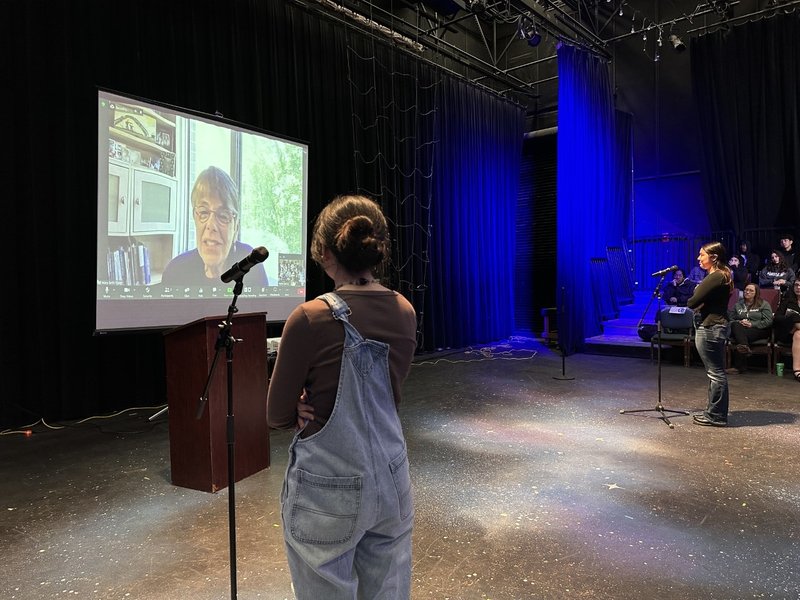For literal decades, there have been arguments and debates as to what is and what is not protected under the First Amendment. On Thursday, students at Pitman High School had the chance to hear from American free speech activist Mary Beth Tinker, who spoke via Zoom to the Pitman Black Box Theatre to over 220 scholars regarding student rights and freedom of speech on school campuses.
Tinker was the plaintiff in the landmark 1969 Supreme Court case Tinker vs. Des Moines, which answered the question whether a prohibition against the wearing of armbands in a public school in protest of the Vietnam War violated students’ freedom of speech protections guaranteed by the First Amendment. In a 7-2 decision, the court ruled that neither students nor teachers “shed their constitutional rights to freedom of speech or expression at the schoolhouse gate.”
Last week’s event was organized by Pitman government teacher Isaac Farhadian, who explained the importance of helping students having a better understanding of their rights and the First Amendment.

"Tinker v. Des Moines is a landmark case that I have taught for many years in my AP U.S. Government and Civics classes and it's the poster child for First Amendment topics dealing with students practicing their Freedom of Speech at school,” Farhadian said. “As students, it’s important that they know they have rights and have protection by the First Amendment, especially today where there is so much confusion as to what is considered free speech or expression. I just decided to do some digging, made calls and sent emails to several places and eventually got in contact with her… When I had the opportunity to invite her to speak with our students, I did not hesitate for a moment.”
Tinker spoke to Pitman students for over 30 minutes, discussing her upbringing and the decision between her and classmates at Warren Harding Junior High in Des Moines, Iowa to take a stand for what they believed in, despite efforts to prohibit her from doing so.
“The idea was to wear black armbands to school for mourning the dead in Vietnam on both sides of the war and to call for a Christmas truce so that the both sides could negotiate,” Tinker explained. “We decided to wear the armbands, but when the principal heard about it, they made a rule against armbands. ‘If any students is wearing an armband and they will be suspended if they don’t.’ Then we had sort of a moral dilemma, but we decided to go ahead and wear the armbands… Five of us got suspended.”
After the suspension, the group was approached by the ACLU, eventually helping win their case at the Supreme Court. One of the biggest lessons she learned was to never stay silent about things you care about and to constantly learn to respectfully engage with everyone, regardless of beliefs or disagreements.
“We can’t sweep controversial issues under the rug. We have to learn to talk about them with respect to others,” Tinker said. “You don’t just start arguing with someone when they say something. You show respect to someone, and you heard what they said. You may not agree with what they said, but you respect them as a human being.”
It was a message that resonated with seniors Calli Noriega and Brock Fanconi.
“Mary Beth Tinker opened the minds of several students at Pitman High School, furthering their intent to exercise their rights and to find a cause to feel strongly about. Tinker gave students encouragement that even as young adults, we can make a difference in the world with our actions,” Noriega said.
“It's easy to forget that youth have the ability to be persuasive, but Ms. Tinker made it clear that our voices are important to the public,” Fanconi added. “Hearing Ms. Tinker's story, I feel as if I'm obligated to share my beliefs and ideas, even though they might be in the minority opinion of students sometimes, so we as a society can have tough conversations about controversial issues and hear and respect each other's opinions in the process.”
Another student in the audience was senior Alice Stessman, who sewed armbands of her own to share with students and show to Tinker.
“I saw Alice in class one time sewing and found it so interesting to see a younger person sew,” said Farhadian. “She is a great student, and when I floated the idea to her to sew armbands similar to the ones Tinker and her classmates wore, she was all for it.”
Stessman explained that Tinker’s case particularly fascinated her for several reasons.
“As a Vietnamese student, the subject matter of the Tinker case is one that has greatly affected the outcome of my life. In making the armbands, I hope to pay homage to that cause as well as Mrs. Tinker's nobleness for championing it,” Stessman said. “What moved me most about the event was that Mrs. Tinker was able to exact such monumental change in the United States at an age so close to my own. In a world where the opinions of the youth are often dismissed, it's invigorating to hear a firsthand account where the rights of adolescents prevail.”
Tinker held a Q&A session with students following her presentation before posing for a group photo. More information on Tinker’s activism as it relates to the First Amendment can be found www.TinkerTourUSA.org.





